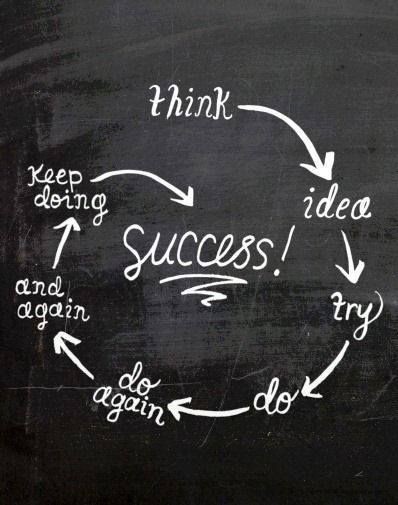
Success is a word that means different things to different people. For some, success is about money, fame, or power. For others, success is about happiness, health, or relationships. But whatever your definition of success is, you can achieve it in one year if you are willing to work hard and smart.
In this article, you will learn 7 tips that will help you become successful in one year. These tips are based on scientific research, proven strategies, and real-life examples of people who have achieved remarkable success in a short period of time. By following these tips, you will be able to set clear and realistic goals, develop a positive and growth-oriented mindset, learn new and valuable skills, build a strong and supportive network, take consistent and effective action, track your progress and adjust your plan, and celebrate your achievements and learn from your failures.
If you are ready to transform your life and become successful in one year, read on and discover how you can make it happen.
1. Build a Growth Mindset
Research by psychologist Carol Dweck suggests that there are two basic mindsets that influence how people think about themselves and their abilities: the fixed mindset and the growth mindset.
People who possess a fixed mindset believe that things such as intelligence are static and unchangeable. Those with a fixed mindset believe that success isn't a result of hard work—it's simply a consequence of innate talents. Because they believe that such talents are something people are either born with or without, they tend to give up more easily in the face of a challenge. They quit when things do not come easily because they believe that they lack the inborn skill needed to excel.

Those who have a growth mindset, on the other hand, feel that they can change, grow, and learn through effort. People who believe that they are capable of growth are more likely to achieve success. When things get tough, they look for ways to improve their skills and keep working toward success. People with a growth mindset believe that they have control of their life, while those with a fixed mindset believe that things are out of their control.
What can you do to build a growth mindset?
- Believe that your efforts matter. Rather than thinking your abilities are fixed or stuck, people who have a growth mindset believe that effort and hard work can lead to meaningful growth.
- Embrace challenges. Instead of avoiding or fearing difficulties, people who have a growth mindset see them as opportunities to learn and grow. They are not afraid to fail, because they know that failure is not a reflection of their worth, but a feedback for improvement.
- Seek feedback. People who have a growth mindset are open to constructive criticism and feedback. They do not take it personally, but use it to improve their performance and skills.
- Celebrate the success of others. People who have a growth mindset are not threatened by the success of others. They are happy for them and learn from them. They do not compare themselves to others, but focus on their own goals and progress.
2. Set SMART Goals
Goals are the foundation of success. They give you direction, motivation, and focus. However, not all goals are created equal. Some goals are vague, unrealistic, or irrelevant, which can lead to frustration and disappointment. To avoid this, you need to set SMART goals.
SMART is an acronym that stands for Specific, Measurable, Achievable, Relevant, and Time-bound. These are the criteria that make a good goal. Let's look at each of them in detail:
- Specific: A specific goal is clear and well-defined. It answers the questions of who, what, where, when, why, and how. For example, instead of saying "I want to be rich", a specific goal would be "I want to earn $100,000 in one year by starting an online business".
- Measurable: A measurable goal is quantifiable and trackable. It has indicators or milestones that show your progress and success. For example, instead of saying "I want to lose weight", a measurable goal would be "I want to lose 10 pounds in 3 months by exercising 3 times a week and eating healthy".
- Achievable: An achievable goal is realistic and attainable. It is challenging but not impossible. It is within your reach and resources. For example, instead of saying "I want to be a famous singer", an achievable goal would be "I want to record a demo and send it to 10 record labels in one year".
- Relevant: A relevant goal is aligned with your values and purpose. It is meaningful and important to you. It supports your other goals and fits your life vision. For example, instead of saying "I want to learn a new language", a relevant goal would be "I want to learn Spanish in one year because I want to travel to Spain and communicate with the locals".
- Time-bound: A time-bound goal has a deadline or a timeframe. It creates a sense of urgency and accountability. It helps you prioritize and plan your actions. For example, instead of saying "I want to write a book", a time-bound goal would be "I want to write a 50,000-word novel in one year by writing 500 words every day".

What can you do to set SMART goals?
- Write down your goals and review them regularly. Writing down your goals makes them more concrete and memorable. Reviewing them regularly helps you stay focused and motivated.
- Break down your goals into smaller and manageable steps. Breaking down your goals into smaller steps makes them easier to achieve and track. It also helps you overcome procrastination and overwhelm.
- Reward yourself for achieving your goals or milestones. Rewarding yourself for achieving your goals or milestones reinforces your positive behavior and boosts your self-esteem. It also makes the process more enjoyable and fun.
3. Learn New Skills
Learning new skills is essential for success. It helps you expand your knowledge, improve your performance, and adapt to changing situations. It also makes you more valuable and marketable in the competitive world. Learning new skills can also enrich your life and make you happier³.
What can you do to learn new skills?
- Identify the skills that are relevant and useful for your goals. Identify the skills that are relevant and useful for your goals and interests. For example, if you want to start an online business, you might need to learn skills such as web design, marketing, accounting, etc.
- Find the best resources and methods to learn the skills. Find the best resources and methods to learn the skills that suit your learning style, budget, and availability. For example, you can use books, online courses, podcasts, videos, mentors, etc. to learn the skills you want.
- Practice and apply the skills regularly. Practice and apply the skills regularly to master them and retain them. For example, you can use the skills in your work, projects, hobbies, etc. to practice and apply them. You can also seek feedback and improvement from others who have the skills.
4. Build a Strong and Supportive Network
Building a strong and supportive network is crucial for success. It helps you access more opportunities, resources, and information. It also helps you get advice, feedback, and support from others who share your goals and values. It also helps you expand your perspective and learn from different experiences.
What can you do to build a strong and supportive network?
- Connect with people who have similar or complementary goals and interests. Connect with people who have similar or complementary goals and interests as you. For example, you can join online communities, forums, groups, etc. that are related to your goals and interests. You can also attend events, workshops, seminars, etc. that are relevant to your goals and interests.
- Provide value and help to others. Provide value and help to others without expecting anything in return. For example, you can share your knowledge, skills, resources, contacts, etc. with others who might need them. You can also offer your support, encouragement, feedback, etc. to others who might appreciate them.
- Maintain and nurture your relationships. Maintain and nurture your relationships with your network by staying in touch, following up, and showing appreciation. For example, you can send messages, emails, cards, etc. to your network to stay in touch. You can also follow up on their progress, achievements, challenges, etc. and show your interest and care. You can also express your gratitude and appreciation for their help and support.
5. Take Consistent and Effective Action
Taking consistent and effective action is the key to success. It helps you turn your goals and plans into reality. It also helps you overcome obstacles, challenges, and setbacks. It also helps you build momentum, confidence, and resilience.
What can you do to take consistent and effective action?
- Start with small and easy actions. Start with small and easy actions that you can do right away. For example, you can start with a 5-minute task, a simple habit, or a quick win. This will help you overcome inertia, procrastination, and fear. It will also help you build confidence and motivation.
- Focus on one thing at a time. Focus on one thing at a time and avoid multitasking and distractions. For example, you can use the Pomodoro technique, which involves working on a task for 25 minutes, followed by a 5-minute break. This will help you improve your concentration, productivity, and quality of your work.
- Review and adjust your actions regularly. Review and adjust your actions regularly based on your results and feedback. For example, you can use the SMART criteria to evaluate your actions and see if they are specific

- Measurable, Achievable, Relevant, and Time-bound. If they are not, you can modify them to make them more effective. You can also use feedback from others or yourself to improve your actions and learn from your mistakes.
6. Track Your Progress and Adjust Your Plan
Tracking your progress and adjusting your plan is important for success. It helps you measure your results, evaluate your performance, and identify your strengths and weaknesses. It also helps you stay on track, motivated, and accountable. It also helps you adapt to changing circumstances, overcome challenges, and seize opportunities.
What can you do to track your progress and adjust your plan?
- Use tools and methods to track your progress. Use tools and methods to track your progress that suit your preferences, goals, and needs. For example, you can use apps, journals, calendars, charts, etc. to track your progress. You can also use indicators, metrics, or criteria to measure your progress. For example, you can use numbers, percentages, ratings, etc. to measure your progress.
- Review your progress and plan regularly. Review your progress and plan regularly to see how far you have come and how much you have left to go. For example, you can review your progress and plan daily, weekly, monthly, etc. depending on your goals and timeframe. You can also use the SMART criteria to evaluate your progress and plan and see if they are still relevant and realistic.
- Adjust your plan as needed. Adjust your plan as needed based on your progress, feedback, and situation. For example, you can change your goals, actions, or timeframe if they are no longer suitable or achievable. You can also add, remove, or modify your goals, actions, or timeframe if you find new or better ways to achieve them.
7. Celebrate Your Achievements and Learn From Your Failures
Celebrating your achievements and learning from your failures is essential for success. It helps you acknowledge your efforts, appreciate your results, and reward yourself. It also helps you boost your self-esteem, confidence, and happiness. It also helps you learn from your mistakes, failures, and challenges. It also helps you grow, improve, and overcome.
What can you do to celebrate your achievements and learn from your failures?
- Recognize and appreciate your achievements. Recognize and appreciate your achievements, no matter how big or small they are. For example, you can write down your achievements, share them with others, or treat yourself to something you enjoy. You can also express your gratitude and appreciation for the people or factors that helped you achieve your goals.

- Learn from your failures and challenges. Learn from your failures and challenges, rather than avoiding or regretting them. For example, you can analyze your failures and challenges, identify the causes and consequences, and find the lessons and solutions. You can also embrace your failures and challenges as opportunities to grow and improve.
- Keep a positive and optimistic attitude. Keep a positive and optimistic attitude, regardless of your outcomes and situations. For example, you can focus on the bright side, the silver lining, or the bigger picture. You can also use positive affirmations, quotes, or stories to inspire and motivate yourself.
Conclusion
Success is not a destination, but a journey. It is not a matter of luck, but a matter of choice. It is not something that happens to you, but something that you make happen.


















